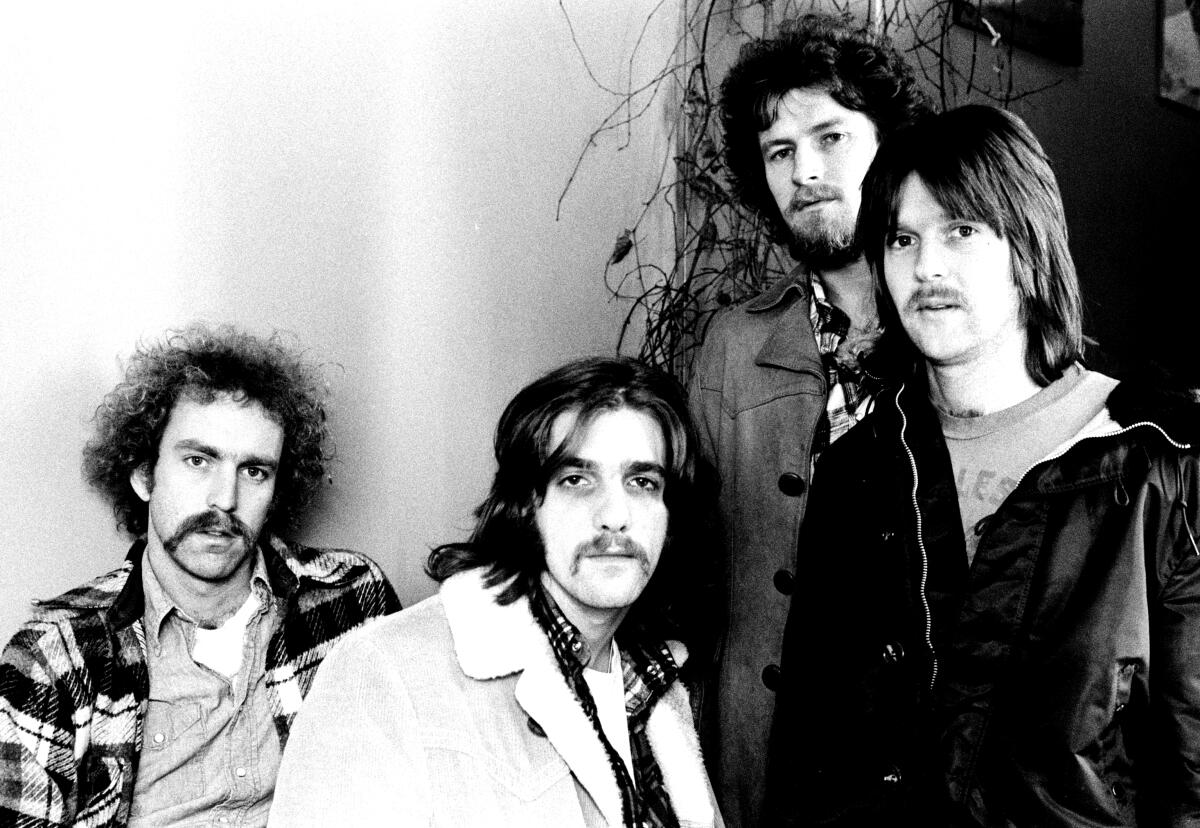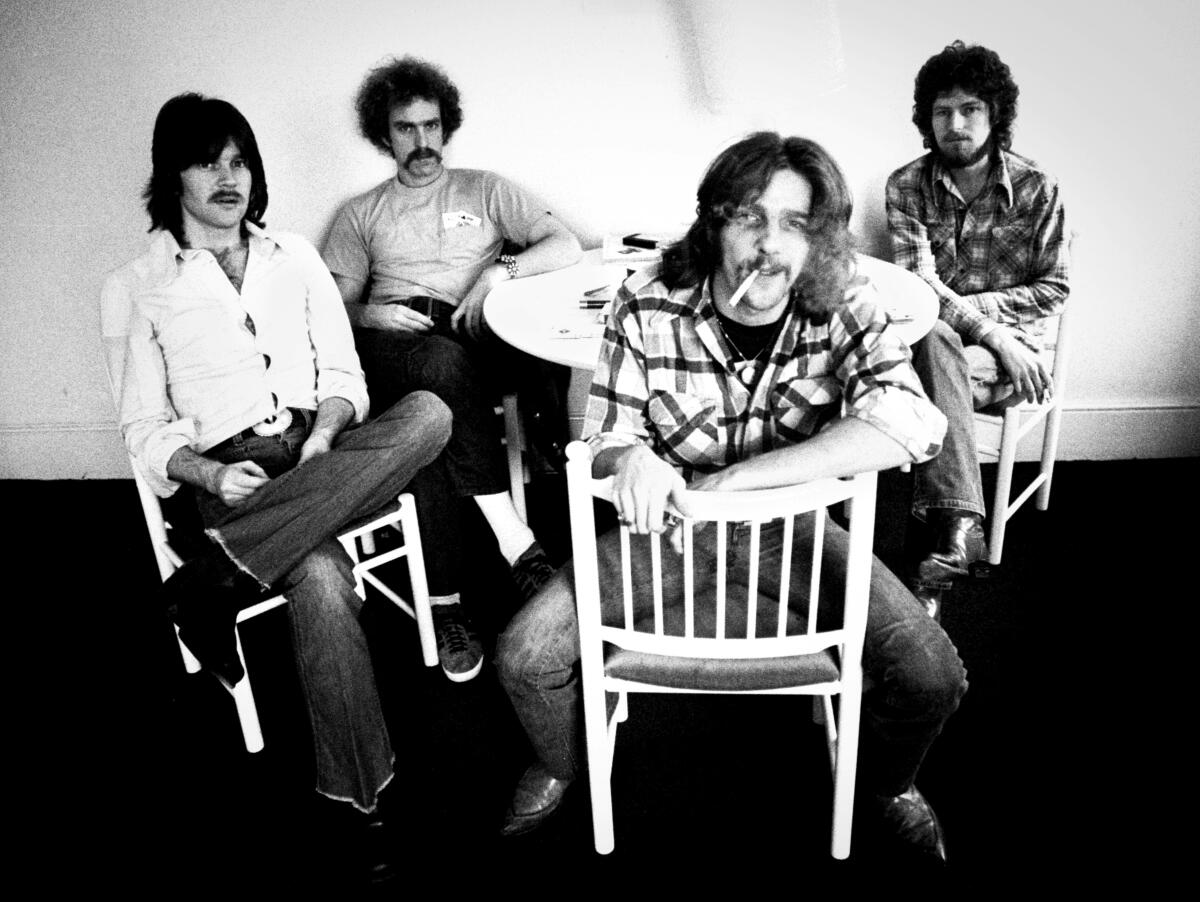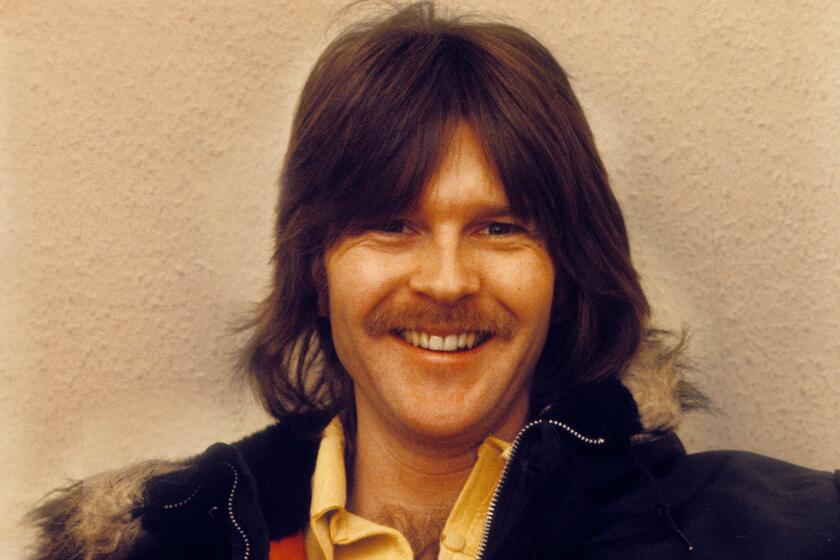‘He had the most beautiful voice’: On the Eagles’ ‘Take It to the Limit,’ Randy Meisner truly soared

- Share via
When the Eagles signed to Asylum Records in September 1971, full of great expectations, bassist Randy Meisner was the most accomplished and successful of the four band members. He’d been in Los Angeles the longest, and even though his career began in a desultory manner and he sometimes supported himself through small criminal enterprises, he’d accomplished the most.
Meisner, who died of heart disease on Wednesday at age 77, was a founding member of the country rock band Poco, along with Richie Furay and Jim Messina, and played on their celebrated first album, released in 1969. Meisner also toured and recorded with Rick Nelson in his impressive Stone Canyon Band. He’d had more success than his Eagles mates Don Henley, Glenn Frey and Bernie Leadon, and Marc Eliot, in his book “To the Limit: The Untold Story of the Eagles,” wrote that Frey “felt privileged to be able to play with” Meisner.
Meisner, who sang lead vocals on the band’s 1975 hit ‘Take It to the Limit,’ has died at age 77 in Los Angeles.
For the record:
11:25 a.m. Aug. 2, 2023An earlier version of this post said Meisner briefly joined Buffalo Springfield. He was not in that band.
The title of Eliot’s book acknowledges the important place of Meisner’s best-known song, 1974’s “Take It to the Limit,” in the success, durability and mythos of the Eagles. It’s not just one of the most popular and best songs by the bestselling American band of all time, it’s one of the best-sung songs in the Eagles’ catalog, or anyone else’s, a controlled, soulful masterpiece.
Nothing in “Take It to the Limit,” which Meisner wrote with Henley and Frey, specifically mentions L.A., but it’s all over the mood of the song. Several Eagles songs dwell in a state of melancholy reverie, with a bruised, worried sense that having been seduced by beauty, danger and a post-’60s ideal of freedom, the singer has frittered away time and romantic opportunities. “Take It to the Limit” does that, but in a more hopeful way than some of the Eagles’ other love songs.
Whether it was planned this way during the writing phase or not, Meisner’s performance benefits from the song’s structure: two verses and two choruses, no bridge. The first chorus doesn’t start until almost 1:20, which is late for a hit song, and when the second chorus ends at about 3:00, the song is effectively over, except for a coda of more than 1:40, in which Meisner builds his case as a great singer. He repeats the chorus phrase “take it to the limit,” then counterpoints it with range-stretching interjections (“please,” “come on and,” “you gotta”) that build tension and urgency and culminate in a sterling falsetto note that he holds, likely at the pinnacle of his unique singing range.
“That fade is remarkable,” guitarist and singer Vince Gill, who joined the Eagles in 2017, said in a phone interview. “It’s a great song, and then you have this glorious fade that allows him to do all those things. God, he had the most beautiful voice.” Gill is now tasked with singing it at Eagles concerts. “Everybody to a man would say, ‘I’d sure rather hear Randy sing it,’ me included,” Gill says with a laugh.

“Take It to the Limit” shows that the Eagles’ sound was more than a hybrid of country and rock. Frey’s slow strumming and ringing, open chords add a country feel to what is, at its essence, an R&B waltz, and Meisner’s walking bass line summons a bluegrass feel. The string arrangement by Jim Ed Norman, Henley’s pre-Eagles Texas bandmate and future president of the Warner Bros. Nashville label, enters on the opening downbeat and, rather than swelling in a corny way, holds steady and adds poise to the song’s mix of emotions.
“Take It to the Limit” was the third single the Eagles released from the “One of These Nights” LP, and it peaked at No. 4 on the Hot 100 chart. It’s been covered by artists from the worlds of R&B, country, rock, bluegrass and pop: Etta James, Waylon Jennings and Willie Nelson, Suzy Bogguss, Blue Denim, Cher, Ruby Turner and Miley Cyrus, among many.

On the first Eagles album, Meisner has three lead vocals, the same number as Frey and one more than Henley. The band made five albums in five years, a grueling pace, and Henley and Frey emerged as superior writers, the faces of the band and its leaders. By 1976’s “Hotel California,” Meisner’s last album with the Eagles, he sang only one song, the similarly gorgeous “Try and Love Again,” which he wrote.
Meisner didn’t enjoy the pressure of singing “Take It to the Limit” live, which caused friction in the band. One night in Knoxville, he refused to go back onstage and sing it as an encore. Meisner punched Frey backstage — the bassist said he was ill and Frey was bullying him. Henley has said Meisner was a hypochondriac and “a major pain in the ass.”
Meisner made three solo albums after leaving the Eagles and had three songs in the Top 40, including “Hearts on Fire,” which made it to No. 19. But by 1982, he was done with solo records. He presumably had enough royalties to live on, from the “Take It to the Limit” and “Try and Love Again” publishing, as well as mechanical royalties on “Their Greatest Hits 1971-1975,” the Eagles compilation that stands as the bestselling album of all time, with certified sales of 38 million copies.
Meisner had a rough first act: He was born in Nebraska, to sharecroppers, married at 14 and dropped out of school to scratch out a few dollars on the Midwest bar circuit. He moved to L.A. in the middle of 1968 and “nearly starved to death,” he told Eliot. Meisner paid the rent by selling weed and stole bottles of milk off people’s doorsteps when he was hungry. He later claimed the Eagles had “blackballed” him in the music business, which isn’t credible, and in retrospect, the moderate success of his three solo albums was commensurate with their quality.
Randy Meisner had remarkable range and feeling in his voice, and under different circumstances, he might have found more showcase songs and earned even more recognition and respect. But on “Take It to the Limit,” he crafted a song that will never fade.
More to Read
The biggest entertainment stories
Get our big stories about Hollywood, film, television, music, arts, culture and more right in your inbox as soon as they publish.
You may occasionally receive promotional content from the Los Angeles Times.











